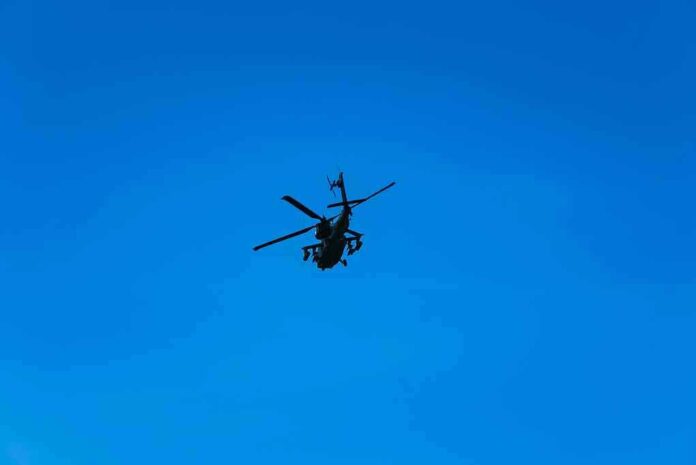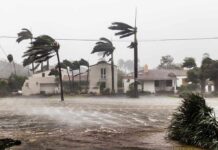
Hurricane Helene rescue efforts marred by helicopter coordination challenges, sparking debates on civilian and military roles.
At a Glance
- Over 6,300 National Guard members from 12 states involved in rescue and recovery operations
- Civilian pilots initially praised for swift adaptability and courageous actions
- Incident involving North Carolina Air National Guard Blackhawk helicopter raises concerns
- Investigation underway to address helicopter landing protocols and communication issues
- FEMA launches rumor response page to combat misinformation during recovery efforts
National Guard’s Massive Response to Hurricane Helene
In the wake of Hurricane Helene’s devastating impact, the National Guard mobilized an impressive force of over 6,300 members from 12 states to assist in rescue and recovery operations. This large-scale deployment showcased the Guard’s commitment to protecting American citizens during times of crisis. Guard members were active across multiple states, including Florida, Georgia, North and South Carolina, Tennessee, and Virginia, with additional support pouring in from as far as New York and Iowa.
The scope of the National Guard’s efforts was truly remarkable. In Florida alone, more than 3,450 Guard members were deployed, rescuing 165 people and over 60 animals, clearing an astounding 2,200 miles of roads, and establishing 36 supply distribution points. These actions demonstrate the Guard’s crucial role in disaster response and their ability to mobilize quickly and effectively to aid communities in distress.
Civilian Pilots: Unsung Heroes Facing Challenges
While the National Guard’s efforts have been widely recognized, the contributions of civilian pilots in the initial stages of the rescue operations deserve equal attention. These brave individuals demonstrated remarkable adaptability and courage, often being among the first to reach affected areas. Their swift response undoubtedly saved lives and provided critical assistance in the immediate aftermath of Hurricane Helene.
“Our priority has been to rapidly deploy to the affected areas and assist emergency responders with rescue operations,” said Maj. Gen. Warner Ross, Tennessee’s adjutant general. “We are working with local emergency management agencies through TEMA by providing forces and support wherever needed. Our Guardsmen are prepared to help with relief efforts for as long as we are needed to ensure the safety of our fellow Tennesseans.”
However, the situation took a contentious turn when civilian pilots found themselves excluded from certain airspaces, despite their proven importance in the relief efforts. This development has raised questions about the coordination between governmental bodies and civilian aviation teams, highlighting the need for improved communication protocols during disaster response scenarios.
The Blackhawk Incident: A Wake-Up Call for Improved Coordination
The controversy surrounding helicopter coordination came to a head with an incident involving a North Carolina Air National Guard Blackhawk helicopter. During a descent near a relief location, the powerful rotor wash from the Blackhawk inadvertently caused chaos, displacing supplies and putting relief workers at risk. This event has brought critical attention to the importance of proper helicopter landing protocols and the potential dangers when coordination is lacking.
“It’s pretty devastating to look at a lot of homes that have been wiped off the foundations and a lot of people that are probably going to be having to restart their lives pretty shortly,” Brig. Gen. Alex Harlamor, Florida National Guard, told CNN Saturday.
The incident has sparked an investigation aimed at resolving these concerns and preventing similar occurrences in future disaster response efforts. It serves as a stark reminder of the complexities involved in coordinating multiple agencies and civilian volunteers during large-scale emergency operations.
FEMA’s Role: Combating Misinformation and Providing Assistance
In response to the spread of rumors and misinformation during the Hurricane Helene recovery efforts, the Federal Emergency Management Agency (FEMA) has taken proactive steps to ensure accurate information reaches affected communities. The agency launched a dedicated rumor response page to address common misconceptions and provide factual information about disaster assistance.
According to a press release on FEMA’s website, Administrator Deanne Criswell has said, she has “the full authority to spend against the President’s budget, but we’re not out of hurricane season yet, so we need to keep a close eye on it.”
FEMA has clarified several key points to help disaster survivors navigate the recovery process. Contrary to some rumors, FEMA grants typically do not need to be repaid, unlike loans from the Small Business Administration. The agency also emphasized that assistance is not limited to the initial $750 Serious Needs Assistance and that they are still accepting housing assistance applications for affected areas.
As the recovery efforts continue, it’s clear that improved coordination between military, civilian, and governmental agencies will be crucial in maximizing the effectiveness of disaster response. The lessons learned from the Hurricane Helene relief efforts will undoubtedly shape future disaster preparedness and response strategies, ensuring that America stands ready to face whatever challenges nature may bring.
Sources:
- https://www.fema.gov/disaster/current/hurricane-helene/rumor-response
- https://www.fema.gov/press-release/20241004/fema-launches-web-page-respond-rumors-and-confirm-facts-related-hurricane
- https://www.nationalguard.mil/News/Article-View/Article/3919179/national-guard-assists-with-hurricane-response-in-southeast/
- https://apnews.com/article/helene-hurricane-damage-fema-trump-biden-harris-e5c1feed690765bac4d7096ce9dceb96
- https://www.nbcnews.com/news/weather/live-blog/hurricane-helene-live-updates-rcna173577
- https://www.af.mil/News/Article-Display/Article/3924004/north-carolina-guard-delivers-food-water-to-hurricane-victims/
- https://www.newsweek.com/volunteer-aid-pilot-groups-blast-fema-military-helene-recovery-1964646
- https://insideclimatenews.org/news/09102024/fact-checking-hurricane-helene-viral-conspiracies/
- https://www.defense.gov/News/Releases/Release/Article/3923795/statement-from-pentagon-press-secretary-pat-ryder-on-dod-support-to-hurricane-h/
- https://www.lemonde.fr/en/united-states/article/2024/10/02/biden-harris-tour-areas-hit-by-hurricane-helene-we-have-towns-that-have-disappeared_6728029_133.html

























